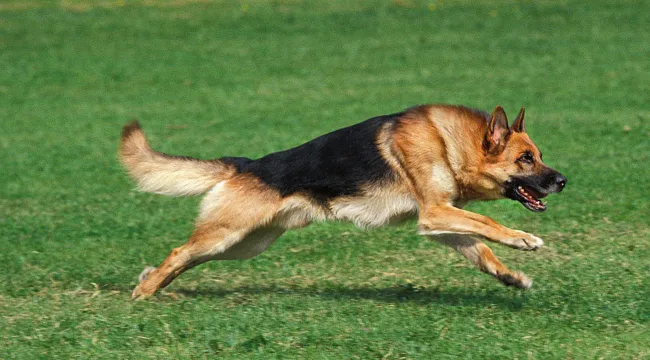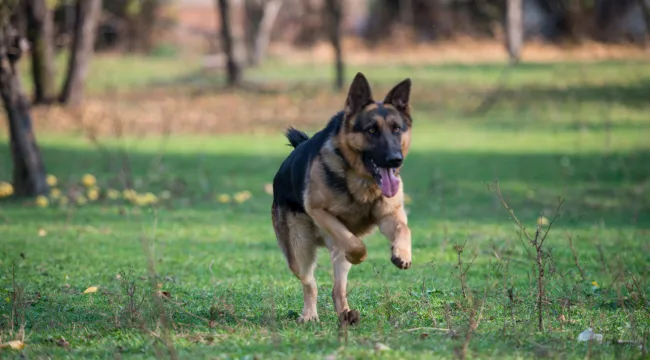
The German Shepherd is one hell of an athletic breed. Their unique build, featuring powerful hindquarters and brawny shoulders, allows them to reach remarkable speeds. And it will surprise you to learn that they are one of the fastest canines on earth, ever ready for a challenge. Little wonder they are a top choice for law enforcement, search and rescue missions, and select sporting activities. Though German Shepherds run quite fast, they’re not in the class of long-distance endurance runners like Siberian Huskies and Labrador Retrievers. They were developed, ab initio, to be perimeter dogs (herders). So they mostly trot to cover more ground while conserving energy. Be that as it may, how fast can a German Shepherd run? Let’s get into it.
What is a German Shepherd’s Top Speed?
As mentioned earlier, this dog breed is more of a sprinter than a long-distance runner. So, a German Shepherd’s top speed is not what you get to see randomly every day. Except you happen to be in public and your pet is locked on a target. Of course, there are other factors and situations that spur German Shepherds to sprint, like playing Fetch.
Generally speaking, a random German Shepherd should reach a top speed of 25–28 miles per hour (40–45 km/h). A healthy and well-trained one, on the other hand, can do anywhere between 30 and 35 miles per hour (48 and 55 km/h), just a little behind a racehorse.
How Long Can a German Shepherd Maintain Its Top Speed?
This is a tricky question, as many factors influence just how long German Shepherds maintain their top speed in a single burst. Sprinters generally don’t run for long, even when locked on prey, which is, in fact, a major source of motivation for hitting top speeds. Cheetahs, for instance, only run for about 15–20 seconds at roughly 70 miles per hour while hunting. Within this short time, they can cover as much as 500 meters.
A German Shepherd in top spirits can cover 5,000 meters effortlessly. Whatever distance they cover after this is extra and a show of their endurance level. While some may go as far as 18,000 meters (rarely), it’s important to pay attention to your dog’s cues. Keep them hydrated and let them rest when it’s required.
Factors That Contribute to A GSD’s Running Speed

- Age
As with humans, age plays a significant role in determining how fast a GSD can run. It only makes sense to not expect Usain Bolt’s speed from a 7-year-old child or a 70-year-old grandpa. Either way, their current top speed cannot be compared to what they could achieve or had achieved in their prime.
- Training Quality and Exercise Frequency
If you must have a top-performing dog, regular exercise is not negotiable. In fact, a lack of exercise will only make them overweight, which will affect their agility appreciably. While you may not need a fast dog, regular exercise is a vital part of a German Shepherd’s health. It keeps them healthy and happy.
- Motivation
As mentioned earlier, some motivation is all a German Shepherd needs to push its limits. As herders, they were trained to keep sheep within a perimeter and protect them. At the sight of a wandering predator, speed was necessary. To really experience and improve your GSD’s speed, play Fetch often in an open space or field.
- Health Status
Overworking your dog, exposure to unhealthy environments, or a poor diet can affect your pet’s health. Common health conditions among GSD are panosteitis, elbow and hip dysplasia, and diabetes. All of these conditions drop your GSD’s speed, so ensure regular vet check-ups and a proper diet.
Tips To Help Your German Shepherd Run Faster
- Provide a proper diet for your pet
- Avoid feeding highly processed food items
- Create time for quality exercise
- Keep the pet hydrated
- Train with agility courses
- Ensure your pet sleeps and rests well
- Ensure regular health check-ups
Wrapping-Up: Safety Considerations

- Help Your Dog Maintain a Healthy Weight
Maintaining a healthy weight is a function of a healthy lifestyle in terms of a balanced, well-planned diet and consistent exercise. German Shepherds are a large breed, so growing big is expected. However, a 1-year-old dog weighing over 100 pounds is definitely not good. In the same vein, a 1-year-old German Shepherd shouldn’t weigh less than 60 pounds (male or female). A simple way to be sure of your pet’s weight is to check regularly using the body and muscle condition scoring system. For more accurate figures, use a scale or visit the Vet.
- Watch out for Hip Dysplasia
This is a skeletal condition common in large-breed dogs. It’s as simple as a misfit in the hip’s ball and socket joint due to poor development. By implication, the bones rub against each other, causing severe pain. Genetics play a major role here, but other factors include unbalanced nutrition, an overly strenuous exercise routine, and obesity. Symptoms of hip dysplasia include enlarged shoulder muscles, inability to walk for long, limping, loss of muscle mass, etc. While it can be managed through weight reduction, reduced exercise, physical therapy, and joint and anti-inflammatory supplements, we strongly advise you consult a veterinarian.
- Prevent Overexertion
German Shepherds are enthusiastic and quite energetic. However, do not mistake enthusiasm for unlimited energy or endurance. Long, intense exercises, especially in hot weather conditions, can lead to dehydration, exhaustion, and heatstroke. So pay close attention to their activity and breathing. Once you notice heavy panting, lagging behind, or a reluctance to continue training, it’s time to get a break. Offer your GSD little sips of water while training, adequate rest periods, and less exercise in hot weather.



